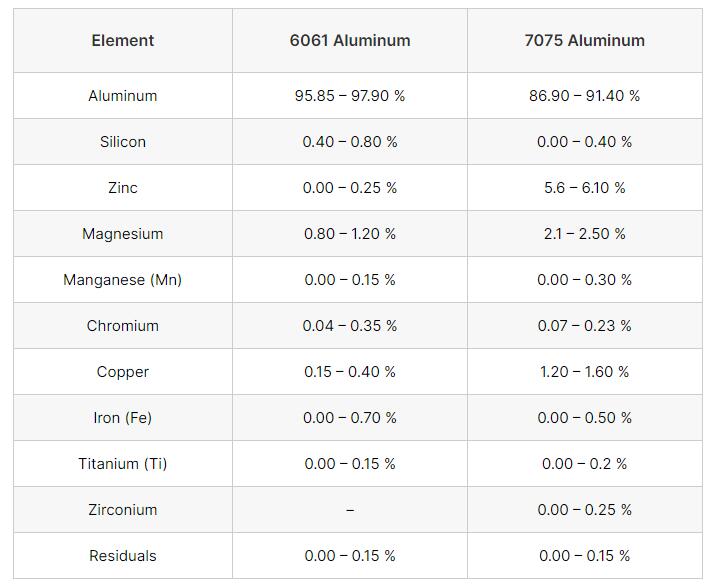When selecting the right material for any engineering or manufacturing project, the choice of alloy is often a key consideration. Among the many aluminum alloys available, 6061 and 7075 stand out as two of the most commonly used options, each offering unique strengths and characteristics that make them suitable for different applications. This article provides an in-depth comparison of 6061 vs 7075 aluminum alloys, examining their properties, strengths, weaknesses, and the ideal scenarios for their use.
Overview of 6061 and 7075 Aluminum Alloys
Both 6061 and 7075 are aluminum alloys, but they belong to different series, which impacts their properties. The difference in composition, mechanical properties, and performance makes each alloy appropriate for specific types of applications. To understand when to choose one over the other, it’s important to first explore the basic features of each.
6061 Aluminum Alloy
6061 aluminum is part of the 6000 series of alloys, which are primarily composed of aluminum, magnesium, and silicon. This alloy is known for its excellent corrosion resistance, ease of fabrication, and relatively good strength. It is a versatile material used in various industries due to its well-rounded properties.
Key Properties of 6061 Aluminum:
- Strength: 6061 offers moderate strength, with a typical tensile strength of 20,000 to 42,000 psi, depending on its heat treatment.
- Corrosion Resistance: It exhibits excellent resistance to corrosion, making it ideal for use in harsh environments like marine and outdoor applications.
- Weldability: 6061 is highly weldable, making it a popular choice for projects that require joining metal parts.
- Machinability: It is easy to machine and can be easily fabricated into intricate designs.
- Applications: 6061 is commonly used in industries such as aerospace, automotive, marine, and construction.
7075 Aluminum Alloy
7075 aluminum, part of the 7000 series, is one of the highest-strength aluminum alloys. It is primarily alloyed with zinc, along with smaller amounts of magnesium and copper, which contribute to its superior strength and hardness. 7075 aluminum is often used in aerospace, military, and other high-performance applications where strength is a critical factor.
Key Properties of 7075 Aluminum:
- Strength: 7075 aluminum is much stronger than 6061, with tensile strengths typically ranging from 73,000 to 83,000 psi, making it one of the strongest aluminum alloys available.
- Corrosion Resistance: While 7075 is resistant to corrosion, it does not offer the same level of protection as 6061, particularly in saltwater or marine environments.
- Machinability: 7075 is more difficult to machine compared to 6061, due to its hardness and strength.
- Weight: 7075 offers an excellent strength-to-weight ratio, which is why it is favored in industries that require lightweight materials with exceptional strength.
Key Differences Between 6061 and 7075 Aluminum
Understanding the key differences between 6061 and 7075 aluminum will help you make an informed decision about which alloy is the best fit for your specific needs. Let’s compare the two alloys based on various characteristics.
1. Strength Comparison
One of the most significant differences between 6061 and 7075 aluminum is their strength. 7075 aluminum is known for its exceptional strength and is often considered the strongest of all the aluminum alloys. The tensile strength of 7075 can be nearly twice that of 6061, making it ideal for applications that require high mechanical strength, such as aerospace and military uses.
- 6061 Strength: Typically 20,000 to 42,000 psi.
- 7075 Strength: Typically 73,000 to 83,000 psi.
Because of its superior strength, 7075 is often used in applications that demand materials capable of withstanding high stress and extreme conditions.
2. Corrosion Resistance
6061 aluminum has superior corrosion resistance compared to 7075, particularly in marine environments or areas exposed to moisture. It is known for its ability to resist rust and corrosion, which makes it a go-to material for industries like construction, marine, and automotive.
- 6061 Corrosion Resistance: Excellent, especially in saltwater environments.
- 7075 Corrosion Resistance: Moderate, but less effective than 6061 in marine or highly corrosive environments.
If your project involves parts that will be exposed to harsh weather or seawater, 6061 is the better choice. However, if corrosion resistance is not as critical, 7075’s superior strength may outweigh its vulnerability to corrosion.
3. Machinability
6061 aluminum is easier to machine and fabricate compared to 7075, making it more suitable for general-purpose manufacturing. It is more forgiving during machining, requiring fewer specialized tools and processes. This ease of machining makes 6061 a preferred choice for a wide range of fabrication processes, including welding, cutting, and drilling.
- 6061 Machinability: Easy to machine and fabricate, well-suited for mass production.
- 7075 Machinability: More difficult to machine due to its hardness and strength, requiring more advanced tools and processes.
If you need to create parts with complex shapes or tight tolerances, 6061 is the better option. However, if the application demands high strength, 7075 may be worth the additional effort and cost to machine.
4. Weight Considerations
Both 6061 and 7075 aluminum alloys are lightweight compared to steel, but 7075 has a higher strength-to-weight ratio. This means that while 7075 is stronger, it still offers the benefit of reduced weight in applications where every ounce counts, such as in aerospace and military components.
- 6061 Weight: Lightweight, ideal for general-purpose applications.
- 7075 Weight: Also lightweight but offers a better strength-to-weight ratio, making it suitable for high-performance applications.
If minimizing weight is a critical factor in your project, and the material needs to withstand heavy loads, 7075 is the ideal choice.
5. Cost Considerations
Because of its higher strength and more complex manufacturing processes, 7075 aluminum is typically more expensive than 6061. The higher cost of 7075 can be a limiting factor for certain projects, especially when strength is not the primary requirement.
- 6061 Cost: More affordable, making it ideal for budget-conscious projects.
- 7075 Cost: More expensive, but justified by its higher strength and performance capabilities.
If you’re working with a tight budget and the strength of 7075 is not necessary, 6061 will be the more cost-effective option.
6. Applications
Due to their differing properties, 6061 and 7075 are used in a variety of applications based on their strength, corrosion resistance, and ease of fabrication.
- 6061 Applications: Widely used in the construction, automotive, marine, and aerospace industries for components such as frames, structural supports, aircraft parts, and sporting equipment.
- 7075 Applications: Ideal for high-performance industries such as aerospace, military, and high-end sporting goods, including aircraft wings, rocket components, military vehicles, and precision tooling.
If your project requires high-strength components that will be subjected to extreme conditions, 7075 is the clear choice. For general-purpose applications requiring moderate strength, excellent corrosion resistance, and ease of fabrication, 6061 is the better alloy.
When to Use 6061 vs. 7075 Aluminum
Choosing between 6061 and 7075 depends on the specific needs of your application:
- Use 6061 Aluminum if you need a versatile, cost-effective material with excellent corrosion resistance and good strength. It’s suitable for general-purpose applications, such as construction, automotive parts, and marine environments.
- Use 7075 Aluminum if your project requires high strength, performance under stress, and a superior strength-to-weight ratio. It’s ideal for aerospace, military, and high-performance sports applications.
Conclusion
Both 6061 and 7075 aluminum alloys have their unique strengths and applications. Understanding the differences between the two allows manufacturers and engineers to choose the best material based on factors like strength, machinability, corrosion resistance, and cost. By carefully evaluating the specific needs of your project, you can ensure that you select the right aluminum alloy for optimal performance, durability, and cost-efficiency.


